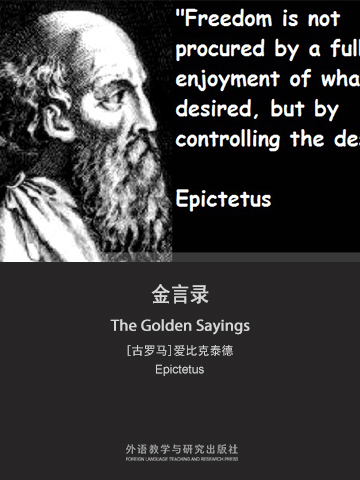斯多葛派学说代表人物爱比克泰德——真正集希腊哲学思想之大成者。
He that hath grasped the administration of the World, who hath learned that this Community, which consists of God and men, is the foremost and mightiest and most comprehensive of all: -- that from God have descended the germs of life, not to my father only and father's father, but to all things that are born and grow upon the earth, and in an especial manner to those endowed with Reason (for those only are by their nature fitted to hold communion with God, being by means of Reason conjoined with Him) --why should not such an one call himself a citizen of the world? Why not a son of God? Why should he fear aught that comes to pass among men? Shall kinship with Caesar, or any other of the great at Rome, be enough to hedge men around with safety and consideration, without a thought of apprehension: while to have God for our Maker, and Father, and Kinsman, shall not this set us free from sorrows and fears?
《金言录》是爱比克泰德的弟子阿利安整理的老师同别人谈话的记录。爱比克泰德对斯多葛派学说有极其重要的发展和突破,是继苏格拉底后对西方伦理道德学说的发展作出最大贡献的哲学家,是真正集希腊哲学思想之大成者。他把注意力集中在对具体的生活伦理学的思考上,重心性实践,主张遵从自然过一种自制的生活,他的思想对后来的哲学与宗教都产生过深远的影响。
It is a series of extracts of the teachings of the Stoic philosopher Epictetus written down by Arrian c. 108 AD. It is unlikely to be word-for-word transcriptions and are probably written-up versions of Arrian's lecture notes. The books did not have a formal title in ancient times.
- CHAPTER I-XX
- CHAPTER XXI-XL
- CHAPTER XLI-LX
- CHAPTER LXI-LXXX
- CHAPTER LXXXI-C
- CHAPTER CI-CXX
- CHAPTER CXXI-CXL
- CHAPTER CXLI-CLX
- CHAPTER CXLI-CLXXX
- CHAPTER CLXXXI-CLXXXIX
- 书评 写书评
- 笔记
-
书评加载中...























 京公网安备 11010802032529号
京公网安备 11010802032529号
笔记加载中...